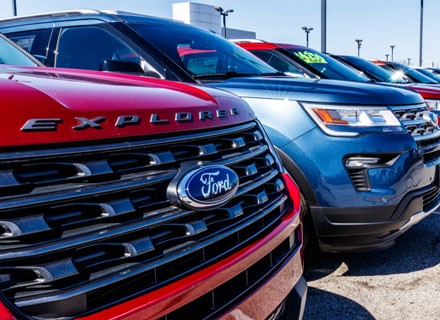During a long road trip in the hot deserts of North America, you try activating your car AC, but it refuses to work. Or in an extreme case scenario, one fine morning, you get locked out of your car, for ignoring the auto loan payment notifications.
These scenarios can turn out to be true, if Ford secures a patent it applied for in 2021 for its “vehicle repossession” technology, under which owners missing monthly auto loan payments could be deprived of using their cars’ important features (also getting locked out of their cars).
This unsettling news was first reported by ‘The Drive’, which accessed the patent document titled “Systems and Methods to Repossess a Vehicle”. It states that the carmaker’s future vehicles will have a data connection, which will be able to stop the functionalities of the car.
Cruise control, automated window and seat controls, air conditioning systems, remote key fobs and automated door locking systems can be disabled through the technology, according to Ford’s patent filing. The vehicles will be remotely directed to “emit an incessant and unpleasant sound every time the owner is present in the vehicle.” The repossession system computer will be authorized to ensure that the sound remains activated till the car owner contacts the bank/lending body to enquire about the loan delinquency.
Cars with autonomous/semi-autonomous driving capability will even be able to move from the owner’s premises to the repossession agency’s office/junkyard. A Ford spokesperson told The New York Times that the company has ‘no plans’ of deploying the technology as of now and the patent submission was its ‘standard business procedure’.
The Invention Is An Ill-Timed One
As per a report from the China Daily, US citizens are now paying USD 1,000 or more a month for car loans, while the loan-default rate in January 2023 exceeded 20%. The average interest rate for new cars grew up to 6.9% in the same month from 4.3% in 2022, according to Edmunds, an online resource for automotive inventory and information. Not only the cost of new vehicles has gone up by 20% since 2020, but second-hand vehicles are also seeing a 37% rise in buying prices.
The delinquency rate for auto loans with 60 or more days past due date increased by 2% and is up by 20.4% from 2022, according to Cox Automotive.
The United States, despite maintaining a strong job market, is going through a cost of living crisis, with low-income households falling behind on car bills. The payment share on so-called “subprime” auto loans rose to over 6% in December 2022. These loans have high-interest rates and are given to people with low credit scores.
Yes, Ford’s Move Is Contentious
The term called ‘Entering Default’ gets imposed on a vehicle owner, when the lending body determines that the person is not going to pay the interest anymore, after a period of 90 days of no payments. The financial body then proceeds to repossess the car. Even if the owner pays the amount some days after the original deadline, it still considers a late one, thus affecting the former’s credit score, apart from the person getting reported to credit-reporting firms Equifax, Experian and TransUnion.
Apart from the vehicle owner’s car coming under repossession risk, the reported loan delinquency and the subsequent drop in credit score will result in the person paying higher interest on new loans/credit, apart from paying higher auto premiums/home insurance. In California and New York, vehicle repossession occurs if an owner is even a few weeks behind on payments, and in this case, creditors don’t even notify the car owners. The right of owners to reinstate their loans varies by loan terms and state rules.
In 2014, disturbing news emerged that nearly 25% of all auto loans of 2013 were given to ‘subprime’ buyers with insanely high-interest rates. Lending institutions also forced buyers to install ‘starter interrupt devices’ on their cars, which allowed the lending bodies to remotely control the starter mechanism and render the vehicles useless before repossessing them. This mechanism even puts the lives of drivers in jeopardy, apart from keeping them in the dark about the fact that their movements have been watched.
And now Ford joins the bandwagon, with its concept of ‘connected vehicle data’, where autonomous devices will punish car owners for defaulting on payments.
While Ford is entitled to justify its move (if implemented) as a solution to ensure that the car owners pay the loan interests on time, it throws the element called empathy out of the window. We are writing this opinion piece at a time when the world is plagued with an economic slowdown and a resultant cost of living crisis. Reports of massive layoffs are dominating the headlines.
There can be multiple reasons behind a person being unable to pay his/her loan interests (job losses, health crises or any other financial difficulties). Businesses (be it car companies or property firms) need to be supportive towards their customers rather than donning the cape of an enforcer.
The urge for generating more market profits should not come at the cost of customers getting into loan debts, and then getting locked out of their cars or in the worst-case scenario, watching the vehicle auto drive itself to the repossession agency’s office/junkyard. Such ‘technological inventions’ will not only portray a car company as a predatory one, but will also lead to a demand slowdown, as prospective customers would prefer commuting in public transportation rather than disturbing their mental peace by buying cars with ‘vehicle repossession’ features.

